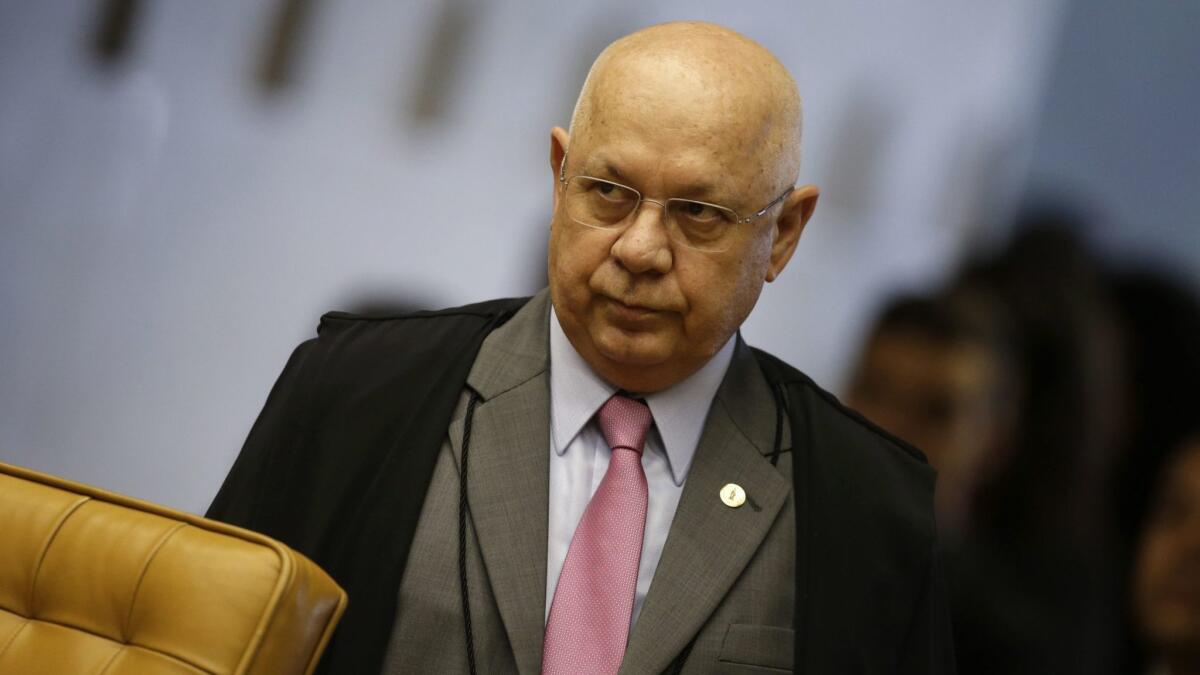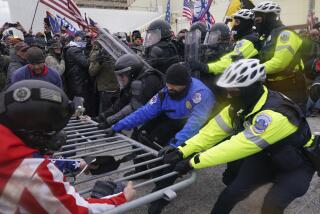Brazil investigates plane crash that killed judge overseeing massive ‘Car Wash’ corruption case

- Share via
Reporting from Sao Paulo, Brazil — Brazilian authorities on Friday were investigating a plane crash that killed the Supreme Court justice in charge of a major corruption case just weeks before he was scheduled to issue a ruling that could have revealed accusations against politicians in several Latin American countries.
The death of Justice Teori Zavascki, 68, in Thursday’s crash is likely to delay, though not derail, the so-called Car Wash investigation, the largest corruption investigation in Brazil’s history. Investigators allege that inflated contracts with state oil giant Petrobras and other state-run companies yielded billions of dollars for bribes and election campaigns.
The small plane went down in heavy rains Thursday just off the coast of Paraty, a colonial town and popular coastal vacation spot about 155 miles west of Rio de Janeiro. Rescuers said Friday that they had recovered all five bodies from the crash — Zavascki, the pilot, a businessman, a woman who worked for the businessman, and her mother.
Although the cause was unclear, many Brazilians voiced fears of foul play since Zavascki held such an important role in the corruption investigation, in which dozens of politicians and businessmen already have been jailed. Transparency International called for a full investigation into the crash, and federal police and the public prosecutor have opened probes alongside those of aviation authorities.
The plane’s voice recorder was found Friday and is being sent to an air force laboratory, the Brazilian air force said in a statement. The wreckage of the plane will also be analyzed.
The prosecutor’s office has already asked aviation authorities for documents about the plane’s maintenance and the cockpit recordings.
While the Car Wash probe — known as “Lava Jato” in Brazil — has been led by a team of prosecutors and Judge Sergio Moro in the southern city of Curitiba, Zavascki handled cases involving politicians. Under Brazilian law, only the Supreme Court can decide to charge or jail federal politicians.
Zavascki had been reviewing dozens of plea bargains of former and current executives of the Odebrecht construction company, which was one of the main players in the kickback scheme that prosecutors say yielded more than $2 billion in bribes over a decade.
The justice was expected to decide which of the Odebrecht plea bargains to validate by February, and his death will probably drag out that timeline. Validation would make them public, potentially implicating dozens of politicians in Brazil and several other countries where Odebrecht did business.
President Michel Temer, who could be one of those implicated in the plea bargains, is supposed to name Zavascki’s successor, who would typically take over the deceased justice’s caseload.
However, the court itself could also decide to transfer Zavascki’s cases to a sitting justice, and the country’s bar association encouraged the court to do so.
About 100 politicians and business executives have already been arrested or are under investigation in Brazil in the probe of alleged money laundering and other corruption. In addition to Temer, senior Cabinet members and close aides and allies of the president have been implicated in testimony from some of those arrested.
More to Read
Sign up for Essential California
The most important California stories and recommendations in your inbox every morning.
You may occasionally receive promotional content from the Los Angeles Times.









